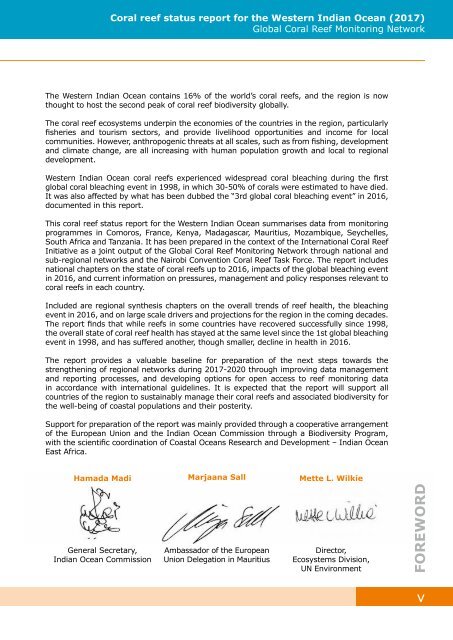GCRMN_COI_2017-Western Indian Ocean Reef Status
GCRMN Western Indian Ocean Coral Reef Status report for 2017. Produced by the Indian Ocean Commission and CORDIO East Africa
GCRMN Western Indian Ocean Coral Reef Status report for 2017. Produced by the Indian Ocean Commission and CORDIO East Africa
Create successful ePaper yourself
Turn your PDF publications into a flip-book with our unique Google optimized e-Paper software.
Coral reef status report for the <strong>Western</strong> <strong>Indian</strong> <strong>Ocean</strong> (<strong>2017</strong>)<br />
Global Coral <strong>Reef</strong> Monitoring Network<br />
The <strong>Western</strong> <strong>Indian</strong> <strong>Ocean</strong> contains 16% of the world’s coral reefs, and the region is now<br />
thought to host the second peak of coral reef biodiversity globally.<br />
The coral reef ecosystems underpin the economies of the countries in the region, particularly<br />
fisheries and tourism sectors, and provide livelihood opportunities and income for local<br />
communities. However, anthropogenic threats at all scales, such as from fishing, development<br />
and climate change, are all increasing with human population growth and local to regional<br />
development.<br />
<strong>Western</strong> <strong>Indian</strong> <strong>Ocean</strong> coral reefs experienced widespread coral bleaching during the first<br />
global coral bleaching event in 1998, in which 30-50% of corals were estimated to have died.<br />
It was also affected by what has been dubbed the “3rd global coral bleaching event” in 2016,<br />
documented in this report.<br />
This coral reef status report for the <strong>Western</strong> <strong>Indian</strong> <strong>Ocean</strong> summarises data from monitoring<br />
programmes in Comoros, France, Kenya, Madagascar, Mauritius, Mozambique, Seychelles,<br />
South Africa and Tanzania. It has been prepared in the context of the International Coral <strong>Reef</strong><br />
Initiative as a joint output of the Global Coral <strong>Reef</strong> Monitoring Network through national and<br />
sub-regional networks and the Nairobi Convention Coral <strong>Reef</strong> Task Force. The report includes<br />
national chapters on the state of coral reefs up to 2016, impacts of the global bleaching event<br />
in 2016, and current information on pressures, management and policy responses relevant to<br />
coral reefs in each country.<br />
Included are regional synthesis chapters on the overall trends of reef health, the bleaching<br />
event in 2016, and on large scale drivers and projections for the region in the coming decades.<br />
The report finds that while reefs in some countries have recovered successfully since 1998,<br />
the overall state of coral reef health has stayed at the same level since the 1st global bleaching<br />
event in 1998, and has suffered another, though smaller, decline in health in 2016.<br />
The report provides a valuable baseline for preparation of the next steps towards the<br />
strengthening of regional networks during <strong>2017</strong>-2020 through improving data management<br />
and reporting processes, and developing options for open access to reef monitoring data<br />
in accordance with international guidelines. It is expected that the report will support all<br />
countries of the region to sustainably manage their coral reefs and associated biodiversity for<br />
the well-being of coastal populations and their posterity.<br />
Support for preparation of the report was mainly provided through a cooperative arrangement<br />
of the European Union and the <strong>Indian</strong> <strong>Ocean</strong> Commission through a Biodiversity Program,<br />
with the scientific coordination of Coastal <strong>Ocean</strong>s Research and Development – <strong>Indian</strong> <strong>Ocean</strong><br />
East Africa.<br />
Hamada Madi Marjaana Sall Mette L. Wilkie<br />
General Secretary,<br />
<strong>Indian</strong> <strong>Ocean</strong> Commission<br />
Ambassador of the European<br />
Union Delegation in Mauritius<br />
Director,<br />
Ecosystems Division,<br />
UN Environment<br />
FOREWORD<br />
v


















